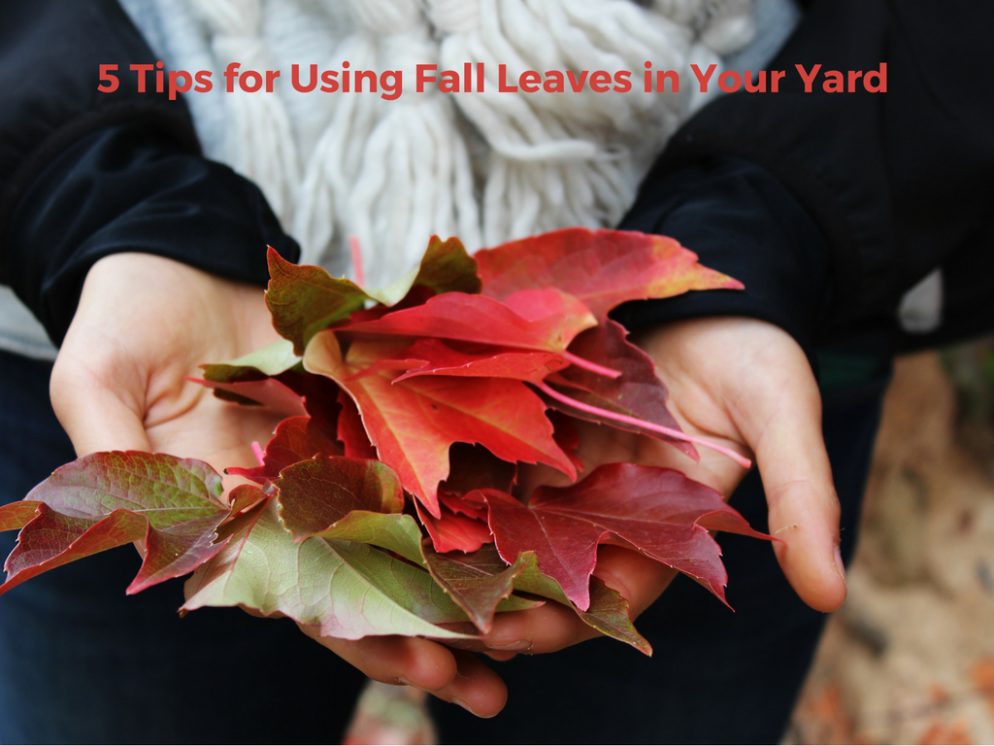[Sing to the beat of Michael Jackson’s “Beat It”]….
You’ve got some leaves just lying on your lawn.
It’s so much work to rake them all up – uh!
Set down the rake and fire up the mower, just leave it, just leave it – uh!

Love raking or loath yard work, leaves are a fixture of fall chores. I often joke with Master Gardeners that us ‘urbanites’ rake up all our organic matter, give it to the city for green waste pick-up, and then buy compost to haul back to our yards. So a common question from gardeners is….can I use my leaves as compost. The answer is YES YOU CAN, read on.
5 Tips for Using Fall Leaves in Your Yard
Fallen leaves produce excellent compost, but it is wise to keep a few considerations in mind on how to properly handle them. Here are some suggestions:
- Small particle size. The size of the leaves make a huge difference on the decomposition rate. Brown leaves are very high in carbon and take a long time to decompose on their own. By chopping them up into smaller pieces, you will speed up the decomposition rate and avoid matting that can sometimes take place when leaves are left whole. Mulchers or lawn mowers are useful tools for chopping up leaves.

- A little at a time. If you plan to add chopped leaves directly to garden soil, do not plan to add too many at one time. Since leaves are very high in carbon, they can increase the carbon to nitrogen ratio in your garden soil which could impact the growth of garden plants the following growing season. One to two inches of mulched leaves is plenty per year.
- Break them down. You can also compost mulched leaves (add leaves to your compost pile). Again, since leaves are high in carbon, it is wise to also add some nitrogen. Add a cup or two of nitrogen fertilizer (organic or inorganic will work fine) to the compost pile to speed up decomposition. Leaves will eventually compost without added nitrogen, but it will take a very long time. You can also add nitrogen to your garden soil if you incorporate mulched leaves directly into your soil.
- Keep it clean. Avoid adding diseased leaves (powdery mildew, coryneum blight, etc.) to your garden soil or compost pile. Give these leaves to green waste instead.
- Know the source. Some plants, such as black walnut, contain allopathic chemicals that infer with plant growth. It is best to not add leaves with allopathic properties to garden soil or your compost pile.
Love it and leave it!

Bonus tip
You will likely have more leaves than you need for compost in any given fall. You can also mow a thin layer of leaves into your lawn. The leaves will help increase the organic matter content in the underlying soil. Just don’t overdo it, a thin layer of leaves is sufficient for healthy lawns and gardens. Never cover grass blades with leaves or you will kill underlying grass plants.



2 Responses to Leave it, just leave it!
Our trees are mostly ashes, cottonwoods, willows and mulberries. Is it true that these trees produce leaves that make the soil more alkaline?
Also, do mulberries have allopathic properties? I cannot get much to grow near them.
thanks!
Hi Melissa-
Sorry for the tardy reply. Ash, cottonwood, willow and mulberry trees will not make the soil more alkaline. Also, I do not believe that mulberries have allelopathic properties – but they sure are yummy! Thanks for the question!